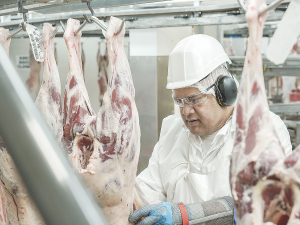NZ Red Meat Outlook 2026: Growth amid trade uncertainty
While things are looking positive for the red meat sector in 2026, volatility in global trade remains a concern, says the Meat Industry Association (MIA).
 Despite all the difficulties, NZ’s red meat exports still exceeded $3 billion during the first quarter of 2022.
Despite all the difficulties, NZ’s red meat exports still exceeded $3 billion during the first quarter of 2022.
While global demand and prices for red meat remain strong, supply chain disruptions and significant processing constraints in New Zealand are having an impact.
Meat Industry Association chief executive Sirma Karapeeva says one of the big issues is the severe lockdown in the key Chinese port of Shanghai. She told Rural News that sheepmeat exports to China were down by 46% and beef by 7%. However, she adds that beef exports to Chin still represented the third highest March volume on record.
"The slowdown in meat exports to China was not NZ-specific, as Chinese import data shows that there was a drop in the volume of all meat imports into China in March," Karapeeva explains. "Probably reflecting the impact of the various lockdowns and port disruptions."
She says the increase in exports to markets other than China, including good volumes to Malaysia and Saudi Arabia, demonstrates how agile NZ exporters are. Karapeeva says companies have sound strategies in place to manage different markets depending on the global conditions.
Despite all the difficulties, NZ red meat exports exceeded $3 billion during the first quarter of 2022. Total exports for the quarter totalled $3.1 billion, a 17% increase on the same period in 2021. Exports to most markets increased, apart from China, which dropped 1% to $1.2 billion.
Red meat exports during March were worth $1.15 billion, increase on March 2021. The value of exports to China dropped 17% to $384m during March, but nearly all other major markets saw an increase.
During March, overall meat exports to the US rose 48% to $288m and the sector saw a record monthly volume of sheepmeat exports to the US (4,295 tonnes worth $83.4m). Overall exports to the UK rose by 22% by value ($65m) and by 18% to Japan ($50m). However, chilled sheepmeat exports to the UK fell by 80% year-on-year to 433 tonnes, reflecting the ongoing logistics issues with transporting chilled products.
Meanwhile, Karapeeva says the chronic labour shortages in NZ continue to be a problem with cattle processing down 11% during the first quarter and sheep processing down 16% compared to 2021. However, processing capacity has since improved.
She says processors are also having to ensure they align livestock volumes at plants with their ability to ship products to markets in the face of the widespread ports congestion, container availability issues and vessel delays.
Agrisea NZ has appointed Craig Hudson as it's new chief growth officer.
State farmer Landcorp, trading as Pamu, is a forecasting a full-year net profit of around $100 million.
Tony Aitken, chief executive of Ruralco, has been awarded the Excellence in Business Leadership Award at the ANZ Business of the Year Awards.
Global trade has been thrown into another bout of uncertainty following the overnight ruling by US Supreme Court, striking down President Donald Trump's decision to impose additional tariffs on trading partners.
Controls on the movement of fruit and vegetables in the Auckland suburb of Mt Roskill have been lifted.
Fonterra farmer shareholders and unit holders are in line for another payment in April.

OPINION: Here w go: the election date is set for November 7 and the politicians are out of the gate…
OPINION: ECan data was released a few days ago showing Canterbury farmers have made “giant strides on environmental performance”.